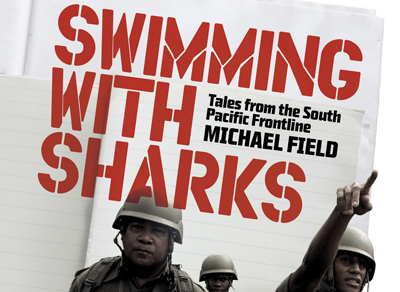
Steven Ratuva
Book review: FIELD WORK: Swimming with Sharks collects the writing of a journalist who is both a hero and a villain among Pacific Islanders.
Swimming with Sharks: Tales from the South Pacific Frontline, by Michael Field. Auckland and Sydney: Penguin. Published in the NZ Listener, August 28-September 3, 2010. No. 3668
AUCKLAND: Infamous for his incisive cynicism, one-liner mocking sarcasm and light-hearted ridicule, journalist Michael Field is adored by fellow cynics and loathed by those who take their political beliefs with dogmatic seriousness. He has been vilified and banned in Fiji, Nauru, Tonga and Kiribati, testimony to his amazing capacity to provoke the wrath of Pacific Island leaders.
Field's new book, Swimming with Sharks: Tales from the South Pacific Frontline, encapsulates the journalistic prose and critical disposition that has made him both a hero and a villain in the Pacific. The style is casual - with wide streaks of generalisation and oversimplification - and would be best suited to light reading on a beach while sipping a bottle of Fiji Bitter, Vailima or Ikala.
Field has several roles in the book: as well as a hero and villain, he is the authoritative storyteller, the self-styled expert on everything Pacific, ranging from politics to morality. This is exactly where the strength of the book lies. It reflects the intense engagement he has with the Pacific and his ability to draw together the most ridiculous and the most sublime into an interesting fusion of experiences from around the vast oceanic continent.
The book captures some of the most defining political events in the Pacific (the Fiji coups, Solomon Islands civil war, Samoan assassination, among others). It is rich in cross-cutting themes and personal reflections on events that have shaped the socio-political dynamics of the small Pacific states.
Field's panoramic scan of Pacific politics reflects two intertwined intellectual dispositions; first, the ability to be part of the individual stories without losing sight of the big picture, and second, casting a cynical eye without losing the seriousness of the issue.
The book is also based on a further dichotomy: on one hand, Field can be seen as a self-righteous "outsider" acting as a self-styled political and moral watchdog for the Pacific; on the other, he can be seen as an "insider" whose survival and sense of identity as "a Pacific journalist" is deeply embedded in the oceanic spirit. This dichotomy helps explain why he incites both antipathy and accolades among Pacific Islanders.
Although the book is full of adventure and containers stunning insider information about Field's forays into elite inner circles, it makes many blank generalisations, such as the insinuation that Fiji's problems have to be explained in terms of the "Melanesian" versus "Polynesian" tension. Nothing is further from the truth.
But such is the style and ethos of journalists who thrive on oversimplification, exaggeration and sensationalism to draw attention to an issue. And Field has drawn attention to many critical issues, in the area of corruption, exploitation, conspiracies, elite secrecies ... the list goes on, with Field acting as an eye and ear for the ordinary people.
For Pacific first-timers, the book should not be used as a Lonely Planet political guide. The impression it leaves is that the Pacific is nothing but a hotbed of "sharks" (a rather unsavoury metaphor), full of cowboy-type thugs, conspiratorial and murderous characters reminiscent of a Shakespearean tragedy and unscrupulous islanders destroying
everything around them. There are few stories of hope, creativity, innovation and joie de vivre to balance the doomsday scenario.
But despite its weaknesses, Swimming with Sharks does reflect Field's journalistic prowess and energy and his eagerness to construct images of the Pacific for the world as well as for the Pacific people themselves, however unpopular they may be. This is why I would gladly buy him a Fiji Bitter next time we meet in Suva ... after the proposed election in 2014, I would think. - NZ Listener/Pacific Media Watch
Dr Sitiveni Ratuva teaches at the University of Auckland's Centre for Pacific Studies and is president of the Pacific Islands Political Studies Association.



